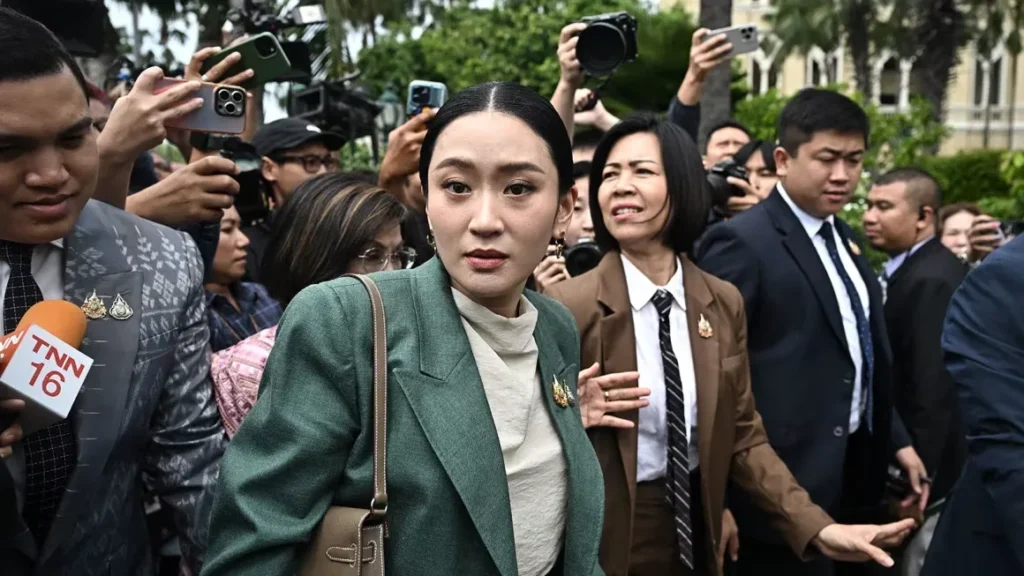Thailand’s political landscape has been shaken yet again after the Constitutional Court abruptly suspended Prime Minister Paetongtarn Shinawatra on July 1, 2025, citing alleged ethical violations tied to a leaked call with Cambodian Senate President and former strongman Hun Sen. With growing coalition fractures, street protests, and regional diplomatic tensions, this scandal marks a pivotal escalation in Thailand’s ongoing political drama.
1. The Constitutional Suspension: Immediate Fallout
First, the Constitutional Court—which oversees ethical conduct in public office—examined a petition filed by 36 senators under Sections 82 and 170 of Thailand’s constitution. They accused Paetongtarn of “gross ethical misconduct and dishonesty” stemming from private remarks made during the call. The court then voted 7–2 to suspend her for up to 15 days, appointing Deputy Prime Minister Suriya Jungrungreangkit as caretaker PM (turn0news12, turn0news18, turn0news15).
Meanwhile, the National Anti-Corruption Commission (NACC) initiated a parallel probe into alleged violations of the code of ethics (turn0search26). During the suspension, Paetongtarn must submit a defense; failure to adequately justify her comments could result in removal from office or disqualification from holding government positions permanently.
2. Inside the Leaked Call: What Was Said—and Why It Matters
Recorded on June 15, 2025, and publicly released by Hun Sen on June 18, the 17-minute phone call revealed highly sensitive diplomatic content. Paetongtarn addressed Hun Sen as “uncle” and asked him to “please have some sympathy for [his] niece” in Thailand. She urged Hun Sen to ignore “the other side” in Thailand—particularly a senior army commander accused of just wanting “to look cool” (turn0search27, turn0search9, turn0search1).
Moreover, she stated she would “take care of anything he wanted,” acknowledging domestic pressure while seeking Hun Sen’s assistance. In the same conversation, she appeared to disparage military leadership—specifically Lt‑Gen Boonsin Padklang, a prominent second army region commander—calling him “an opponent” (turn0search1, turn0search4).
Diplomatic protocol experts remarked that the language reflected excessive deference and possibly undermined Thai sovereignty (turn0search4, turn0search9).
3. Rising Nationalist Outrage and Coalition Collapse
Next, nationalist forces seized on the leak. Conservative Yellow Shirt protestors, veterans of earlier Shinawatra-era upheavals, rallied at Bangkok’s Victory Monument demanding Paetongtarn’s resignation. The demonstration, organized by United Force of the Land, marked the largest protest since Pheu Thai regained power in 2023 (turn0news15, turn0search0).
In tandem, the centrist Bhumjaithai Party, holding 69 seats, exited the coalition on June 18, citing Paetongtarn’s remarks as damaging to Thailand’s national dignity and military esteem (turn0news18, turn0search26). This withdrawal reduced Paetongtarn’s parliamentary majority to a precarious 261–495, risking further defections from coalition partners like the United Thai Nation Party (turn0search1, turn0news22).
Political analysts now consider her grip on power nearly untenable. The opposition People’s Party—successor to the dissolved Move Forward Party—has called for fresh elections, citing the scandal as the “last straw” (turn0news15, turn0search0).
4. Border Tensions: The May 28 Skirmish and Diplomatic Fallout
Storm clouds had been gathering along the Thailand–Cambodia border since May 28, when armed soldiers clashed near Preah Vihear Temple, leaving one Cambodian soldier dead (turn0search26, turn0news16). Both nations blamed each other, with Thailand accusing Cambodia of firing first; Cambodia—but escalating troop deployments, trade sanctions, and even media bans soon followed (turn0search26, turn0news17, turn0news16, turn0news19).
Hun Sen publicly condemned Thai military actions, labeling them “violations of Cambodian sovereignty” and threatening referral to the International Court of Justice (ICJ)—a prospect firmly rejected by Thai officials who prefer bilateral negotiation (turn0news12, turn0news13, turn0news16).
In step, Cambodia imposed a series of retaliatory measures: banning Thai fruit imports, soap operas, and select broadcasts, while restricting fuel and electricity imports—and briefly closing land border checkpoints—which deepened economic and media tensions (turn0news17, turn0news19, turn0search26).
Before we move on to the next tool, here is a recommended article you might find valuable.
For developers and designers experimenting with AI‑built visuals, our article on top AI image generators is a great resource.”
It fits naturally after discussing AI content creation
5. Historic Context: Preah Vihear and Colonial-Era Disputes
This is not the first time the Preah Vihear Temple region has caused hostilities. Historically, the 1907 Franco-Siamese treaty—and a later ICJ ruling in 1962—awarded the temple area to Cambodia, but left surrounding zones contested (turn0search23, turn0search25). Subsequent military engagements (2008–2011) claimed dozens of lives and marked the area as a well-known flashpoint (turn0search25, turn0news20, turn0search26).
Thus, tensions are rooted in deep historical, religious, and nationalistic factors that have periodically reignited conflict, making the current flare-up part of a centuries-old territorial dispute (turn0search25).
6. Shinawatra Dynasty: Famously Resilient—but Facing New Threats
Paetongtarn belongs to the influential Shinawatra dynasty: daughter of ex‑PM Thaksin and niece of Yingluck Shinawatra, both ousted in high-profile coups (2006 and 2014, respectively). While elected under populist platforms, both faced legal charges and military intervention. Paetongtarn, at just 38, entered office in August 2024 as Thailand’s youngest leader, vowing modernisation and distancing herself from her family’s political baggage (turn0search5, turn0search7, turn0search6).
However, her administration has struggled to translate promises into rapid progress. Critics cite a lacklustre economy, stalled casino legalisation, inconsistent minimum wage reforms, reversal on cannabis policy, and limited trade progress with the U.S.—all factors now exacerbating the fallout from the phone call scandal (turn0search5, turn0search3).
Royalist voices argue she “prioritises family interests over national welfare,” and that her deference to Hun Sen reflects a troubling pattern of elitism and diplomatic naïveté reminiscent of her predecessors (turn0search5, turn0search3, turn0search11).
7. Military and Public Trust: Risk of Another Coup?
The leaked phone call directly targeted a sitting military commander, provoking backlash from the Royal Thai Army—a body that has staged over a dozen coups since 1932. Army chief General Pana Claewplod, flanked by officers, issued a unified statement pledging allegiance to democracy—but noted that Thai unity mattered most for national sovereignty (turn0search0, turn0search6).
Nevertheless, analysts warn that the breach of military protocol and declining public trust make another military intervention increasingly plausible. Comparisons are already being drawn with coups that ended both Thaksin’s and Yingluck’s governments (turn0search5, turn0search6).
8. Diplomatic Moves: Between ICJ and Bilateral Talks
Hun Sen has suggested taking the border dispute to the International Court of Justice, but Thailand insists on continued bilateral diplomacy. On June 26, both leaders visited border zones—Paetongtarn in Aranyaprathet and Hun Sen at the Cambodian border—to signal authority and calm local tensions (turn0news14, turn0news16).
Thailand also lodged a formal diplomatic protest, denouncing the leak as a “serious violation of trust” and breaching diplomatic etiquette (turn0search9, turn0search0). Meanwhile, both nations have scheduled a joint border commission meeting in September, though progress remains slow and precarious (turn0news14, turn0search25).
9. Economic Impact: Investors Flee, Tourism Shaken
Amid rising instability, Thailand’s Stock Exchange dropped by around 4% in response to investor concern over trade disruptions and political uncertainty (turn0news15, turn0news18). Thailand’s tourism sector—already managing COVID-19 recovery—faces added threats from Cambodia’s media bans and closure of travel lanes (turn0news17, turn0news19).
Companies linked to cross-border supply chains—especially in agriculture, transport, and logistics—are bracing for cascading disruptions stemming from trade sanctions and mounting nationalism.
10. What Comes Next: Scenarios for Thailand’s Political Future
Over the coming weeks and months, Thailand may face:
- Constitutional Court verdict: If Paetongtarn’s defense is rejected, she may be ousted and potentially barred from holding office.
- Coalition collapse: The departure of Bhumjaithai and the potential defection of United Thai Nation could trigger a vote of no confidence.
- Care-taker government: Suriya Jungrungreangkit faces an uphill battle keeping the coalition intact while under intense public and military scrutiny.
- Snap elections: Opposition forces may push for Parliament’s dissolution, risking early polls before widespread recovery from the current economic and border crises.
- Diplomatic crisis: Escalating military mobilization along the border—along with Cambodia’s ICJ threat—could tense regional security.
- Coup risk: Given Thailand’s history, another military overthrow cannot be ruled out if institutional trust continues to collapse.
- Public unrest: Continued protests by Yellow Shirts and royalist factions may broaden into larger civil action if democracy is perceived as threatened.
People Also Search For
Paetongtarn phone leak, Hun Sen call scandal, Thailand Cambodia preah vihear clash, Bhumjaithai quits coalition, Paetongtarn caretaker PM Suriya, no confidence Thailand 2025, Thai coup risk, Shinawatra dynasty crisis, Thailand protests Bangkok 2025, ICJ border dispute Cambodia, Preah Vihear international court, Thailand military reaction call leak
🔗 News & Analysis Sources
- apnews.com
- reuters.com
- apnews.com
- reuters.com
- reuters.com
- apnews.com
- reuters.com
- theguardian.com
- en.wikipedia.org


